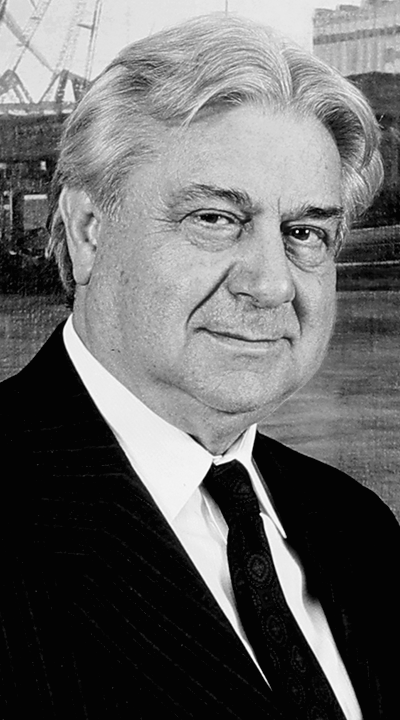
Eletson Corporation became one of the world’s most admired tanker companies under the leadership of four ship’s masters including John Karastamatis and his brothers-in-law Apostolos Hadjieleftheriadis and Erric Kertsikoff, all of whom have been inducted together into the Greek Shipping Hall of Fame.
Also greatly responsible for the company’s success was Apostolos’ younger brother Gregory Hadjieleftheriadis (born 1938), who is the last survivor among Eletson’s founders.
John Karastamatis was born into a poor farming family on the island of Andros. His first job as a young boy was serving drinks and food at his parent’s coffee shop, sometimes to big local shipowners who would frequent their café.
After the Second World War, Karastamatis saw shipping as the only path to earning a better livelihood. After his national service in the navy, he embarked on his first ship, Greek Line’s transatlantic liner, Neptunia. After two years on board, he sought a transfer to one of the tramp cargo vessels run by Greek Line’s owners, the Goulandris family from his home island of Andros.
Later, he captained a series of newbuilding tankers for N. J. Goulandris, including the Nicholas J. Goulandris, the largest vessel under Greek flag when delivered in 1968. He continued working for the Goulandris group even after the establishment of Eletson and he served for three years managing the group’s shipyard in Syros, Neorion. In 1973, he left to concentrate exclusively on Eletson.
All four of the Eletson founder-directors distinguished themselves as merchant marine officers and pooled their combined savings of about $50,000 in order to start their own shipping venture.
In 1966, the family made its debut as shipowners purchasing a 30 year-old combination carrier of 2,500 tons. At the time Eletson was launched, Karastamatis had been the oldest and most experienced seafarer among the partners. Despite the obvious contrast between the small, old freighter that would become the Maria T and the Goulandris fleet he was used to, he gave the green light for Eletson’s first purchase.
“It was a difficult decision for me but I knew that if we didn’t take the risk then, it might be a long time before we would find another opportunity to start something of our own,” he later recalled.
While the early years of Eletson saw John Karastamatis and his partners acquire various vessels, both dry cargo and tankers, by the early 1980s the company had decided to specialise in tankers and in particular product tankers.
Later that decade Eletson came to world attention by ordering the first-ever series of modern double-hull tankers – three years before the Exxon Valdez spill and the subsequent US Oil Pollution Act gave rise to the double-hull era.
Between 1989 and 1996 Eletson ordered another 24 product tanker newbuildings, including vessels with double decks and others incorporating a longitudinal bulkhead as well as double hull. By 1996 it had one of the first fleets comprising only double-hull tankers.
The co-founders insisted on the highest quality and an ‘industrial shipping’ culture for their company that differentiated it sharply from almost any other Greek shipping company of that era.
Eletson was among the first Greek shipowners to establish a proper holding company and corporate structure. It was a leader in computerisation, transparency and human resources, with all of the founder-directors remaining life-long contributors to maritime education.
In 1993 Eletson placed the very first high-yield bond issue for a European shipping company in the US public debt market. The $140 million in capital was 100% pre-paid to bondholders just eight years later.
Another trailblazing move that came the following year saw Eletson order four 46,000 ‘Double Eagle’-design tankers from Newport News Shipbuilding in Virginia. They would have been the first merchant ships built for a foreign owner by a US yard in 40 years, but due to construction delays they were never delivered to Eletson and were later acquired by Mobil Shipping and Transportation.
Despite the company’s innovations, a key ingredient in its culture and a unifying characteristic of the four partners were their experience of ships from their careers as masters and their consistent belief in the merits of Greek seafarers. The fleet was also Greek-flagged throughout and the vessels all bore the names of Greek islands.
In 2000-2001, the company contracted its first aframax product tankers as well as two panamax tankers, all with Hyundai Heavy Industries. The orders were the last it would place with all four of the founder-directors still at the helm.
Throughout his career, Karastamatis remained true to his humble origins and preferred to identify himself as a seafarer rather than shipowner. He served as the group’s president until 1997 and was later chairman.
In recent years, Eletson has continued to be a high-quality operator of product tankers under the management of the second generation of the owning families. Karastamatis remained at the side of the new generation of management until the end and he livied to see Eletson diversify into the liquefied petroleum gas (LPG) carrier market.

